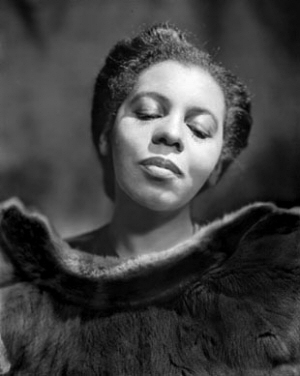Related Research Articles

Inuit throat singing, or katajjaq, is a distinct type of throat singing uniquely found among the Inuit. It is a form of musical performance, traditionally consisting of two women who sing duets in a close face-to-face formation with no instrumental accompaniment, in an entertaining contest to see who can outlast the other; however, one of the genre's most famous practitioners, Tanya Tagaq, performs as a solo artist. Several groups, including Tudjaat, The Jerry Cans, Quantum Tangle and Silla + Rise, also now blend traditional throat singing with mainstream musical genres such as pop, folk, rock and dance music.

Morna Anne Murray is a Canadian singer of pop, country, and adult contemporary music, who has sold over 55 million album copies worldwide during her over 40-year career. Murray has won four Grammys including the Grammy Award for Best Female Pop Vocal Performance in 1979.

Portia May White was a Canadian contralto, known for becoming the first Black Canadian concert singer to achieve international fame. Growing up as part of her father's church choir in Halifax, Nova Scotia, White competed in local singing competitions as a teenager and later trained at the Halifax Conservatory of Music. In 1941 and 1944, she made her national and international debuts as a singer, receiving critical acclaim for her performances of both classical European music and African-American spirituals. White later completed tours throughout Europe, the Caribbean, and Central and South America.

Tanya Tagaq, also credited as Tagaq, is a Canadian Inuk throat singer, songwriter, novelist, and visual artist from Cambridge Bay (Iqaluktuuttiaq), Nunavut, Canada, on the south coast of Victoria Island.
Thomas James Hunter, CM, O.Ont is a Canadian country music performer, known as "Canada's Country Gentleman".

Marg Osburne was a Canadian country, folk and gospel singer. She was a recipient (posthumously) of the ECMA Stompin' Tom Connors award.

Chopped is an American reality-based cooking television game show series created by Michael Krupat, Dave Noll and Linda Lea. It is hosted by Ted Allen. The series pits four chefs against each other as they compete for a chance to win $10,000. The series debuted in 2009, and episodes air every Tuesday at 8 p.m. ET on Food Network.
Ti lascio una canzone was an Italian music talent show for aspiring singers aged 7 to 15, all of whom were required to cover the most beloved songs in the history of Italian pop music.

Pierre Brabant was a Canadian composer and pianist. He appeared in concerts and recitals throughout Canada and performed numerous times on Canadian television and radio. He wrote music for a number of programs for the Canadian Broadcasting Corporation and worked as a composer, arranger, and music director for numerous recordings by a variety of Canadian artists. Starting in 1987 he performed regularly in concerts and recitals as the accompanist for opera singer Joseph Rouleau.

A Friend in London was a Danish pop rock and rock band that represented Denmark in the Eurovision Song Contest 2011 in Düsseldorf, Germany, with the song "New Tomorrow" and took fifth place in the final with 134 points. The group announced their split in 2014.
Pick the Stars is a Canadian entertainment competition television series which aired on CBC Television from 1954 to 1957.

Claire Gagnier was a Canadian soprano singer from Quebec.

Charlotte Cardin is a Canadian pop, electro and jazz singer and songwriter from Montreal, Quebec. Cardin began her career as a model at the age of 15, where she appeared in numerous advertising campaigns such as Barilà.

The Masked Singer is an American reality singing competition television series that premiered on Fox on January 2, 2019. It is part of the Masked Singer franchise which began in South Korea and features celebrities singing songs while wearing head-to-toe costumes and face masks concealing their identities. Hosted by Nick Cannon, the program employs panelists who guess the celebrities' identities by interpreting clues provided to them throughout each season. Ken Jeong, Jenny McCarthy Wahlberg, Nicole Scherzinger, and Robin Thicke appear in each episode and vote alongside an audience for their favorite singer after all perform. The least popular is eliminated, taking off their mask to reveal their identity.
Opportunity Knocks was a talent competition show that aired on CBC Radio from 1947 until 1957. It was created and directed by John Adaskin. The show featured a variety of performers hoping to break into the entertainment industry, including singers, instrumentalists, composers, announcers, and actors.

Eleanor Collins is a Canadian jazz singer, television host and civic leader. She is known as the Canadian First Lady of Jazz.
Phyllis Irene Elizabeth Marshall was a Canadian singer and actor. She was one of the first Canadian television stars, described by Encyclopedia of Music in Canada as a "pioneer among black Canadian performers".
James Milligan was a Canadian singer who appeared in concerts and operas from the early 1950s until his death in 1961 at the age of 33. In the year of his death he achieved a major triumph at the Bayreuth Festival as Wotan, a.k.a. "The Wanderer", in Richard Wagner's Siegfried for which he achieved international fame. In 1957 he won first prize at the Geneva International Music Competition. His voice type has been variously labeled as either a baritone, dramatic baritone, bass-baritone, and a bass. Standing at nearly 6 foot 6 inches and possessing a trim athletic build, Milligan was visually striking on stage. This aspect in combination with a charismatic stage personality captivated audiences at theaters in Canada and Europe. His voice is preserved on several recordings made with the English conductor Malcolm Sargent for the EMI record label, and on several recordings made with the Toronto Symphony Orchestra and Toronto Mendelssohn Choir.
Nos futures étoiles was a national music competition and radio program in Canada that was founded by CBC Montreal. It was broadcast annually on CBC Radio from 1947 through 1955. Created as a French-language counterpart to the English-language competition Singing Stars of Tomorrow, it was originally only a singing competition when it was established in 1947. Women and men competed in separate divisions in the singing competition, and a prize was awarded to one woman and one man each year. The competition initially awarded a prize of $500, but the prize award was later raised to $1000. In 1952 an instrumental music prize was added to competition categories. Contestants would perform live with an orchestra led by conductor Giuseppe Agostini. The competition ceased after the conclusion of the 1955 competition when it was replaced by another competition in 1956, the Concours de la chanson canadienne.
References
- ↑ "'Singing Stars of Tomorrow'". The Canadian Encyclopedia.